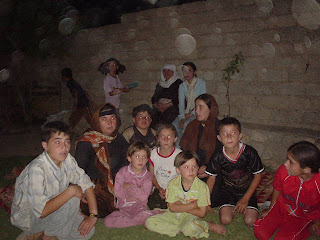A question asked, lightheartedly, of friends in a pub or at a party, when the atmosphere is mellow and the appetites sated, laughter fills the air and the cares of every day life are far behind.
"If everything was to be taken from you except for one thing," the questioner asks, "what would you choose to keep?"
Take a moment and think about your answer.
What did you say? Your house? Your car? Your favourite shoes? Perhaps it was your computer, or your guitar, the watch your father left you, the family Bible that has been on the shelf since Great Grandfather's day? Your dog? Your spouse? Your child?
There are many things in our lives without which we would feel the poorer, many things we treasure and will do our utmost to keep. But finding something precious is not the same thing as being unable to live without it. If your house collapsed or your car was stolen, you'd live. The shoes, the computer, even Daddy's watch, can be replaced, albeit with some sadness. Even the heartbreak of losing a family member will not actually kill you, although it may feel like it has for a long time afterwards.
Perhaps you thought of food. Without food, our health will suffer, our bodies shut down, eyes go blind, muscles waste, our stomachs devour themselves and, eventually, we die, in agony. It can take weeks.
But without water, the end, though just as agonising, comes much quicker. Water deprivation kills in just a few days. And without water to grow crops and sustain livestock, there is no food. Rain is needed to fill the streams and rivers and irrigation channels. If the rain doesn't come, we are soon in trouble.
In April, the UK had a heatwave. For some weeks, the sun shone and no rain came. Children played, lawns were mowed, washing dried on outside lines. But soon the farmers complained. The crops suffered, food was not growing as it should. In a very short space of time, the blessing of sunshine had become a curse, and everyone was glad when it finally rained in May.
Imagine if it had not rained for two years or more. If the sun beat down and the earth cracked, and plants withered as reservoirs dried. If livestock died and the earth turned to dust. If your child was crying for want of a meal, every spare ounce of flesh gone from their bodies, the weakest, and youngest, giving up the fight for life.
This is exactly the predicament of the people in East Africa. For two years and more, the rains have failed to arrive and now, the situation has reached crisis point. In the worst places, it has been exacerbated by conflict and war, and ordinary people have, through no fault of their own, watched their lives crumble. There is, literally, nothing left for them.
In desperation, they leave behind the things they find they CAN do without: home and possessions. They gather their families and walk towards the faint promise of help. They walk for weeks, hungry, thirsty, sun baked. They hide in brush to escape warriors and guerrillas, and bandits who will even take the clothes from their backs, until they reach refugee camps which are overcrowded, filled to four times their capacity. Camps with resources that are so stretched, it can take ten days to get the first help.
And here they sit, patiently waiting in makeshift shelters or under trees, desert dust swirling about them. Some abandon their children at the entrance and melt away, hoping the aid workers can care for the little ones better than they can. The problem seems so big, insurmountable.
But the truth is, it isn't insurmountable. A very small amount of help can make a world of difference. The money a person in the UK spends on a king sized Mars Bar, to eat for a moment's pleasure, is all that is needed to feed EIGHT people all the food they need for a whole day. 68 pence. A US Dollar. Eight people.
Could you live without a Mars Bar, or a similarly priced indulgence every day for just one month? If you could, you'd have saved yourself £20. But if you were to give that money to our East Africa Drought Appeal, you'd save a great deal more. You'd save lives.
What can you not live without?
 This viable alternative is what World In need is working to provide. Through our child sponsorship programme, we aim to give children a start in life that will enable them to make better, safer and more hopeful choices in the future.
This viable alternative is what World In need is working to provide. Through our child sponsorship programme, we aim to give children a start in life that will enable them to make better, safer and more hopeful choices in the future.






